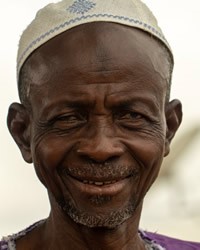Hausa in Cameroon

Photo Source:
Erik Laursen, New Covenant Missions
|
Send Joshua Project a map of this people group.
|
| People Name: | Hausa |
| Country: | Cameroon |
| 10/40 Window: | No |
| Population: | 441,000 |
| World Population: | 59,120,000 |
| Primary Language: | Hausa |
| Primary Religion: | Islam |
| Christian Adherents: | 0.10 % |
| Evangelicals: | 0.08 % |
| Scripture: | Complete Bible |
| Ministry Resources: | Yes |
| Jesus Film: | Yes |
| Audio Recordings: | Yes |
| People Cluster: | Hausa |
| Affinity Bloc: | Sub-Saharan Peoples |
| Progress Level: |
|
Introduction / History
The Republic of Cameroon is located on the western coast of Africa, just south of Nigeria. Combined with the Fulani, the Hausa are the largest ethnic group in West Africa. The Hausa are originally from an area known as "Hausaland," a region covering 75,000 square miles and straddling the borders of Niger and Nigeria. The Hausa began to migrate to Cameroon at the end of the nineteenth century. In the nineteenth century, very few of the Hausa immigrants came to Cameroon with wives. Instead, as soon as they began to make a living in any area, they would take local wives and start to build families. However, they would invite Hausa priests to settle near them so that their children would be educated in the Koran. This was done in order to reduce the influence of the children's non-Hausa mothers, and to keep the Hausa culture alive. Traditionally the Hausa had a feudal society where the ownership of land and other valuable resources was restricted to certain families and individuals. Those beneath them were the commoners who mainly worked the land but benefitted very little from it. They Hausa were traditionally merchants who traded ivory and kola nuts with North African traders. Between 1884 and 1916, Cameroon was a German colony. The Germans recruited many Hausa traders to act as guides and as spies. Some Hausa soldiers even served in the German campaigns. The Germans favored the Hausa over other tribes due to their more civilized and trade-oriented society. Though the Hausa are especially populous in Nigeria where they are merging with the Fulani, they also live in most West African nations and as far east as Sudan.
What Are Their Lives Like?
This is a very prominent people group throughout West Africa. They have their own clothing style, their own cuisine, and their language and culture dominates West Africa. The Hausas were very instrumental in developing the economy in Cameroon. The Hausa are very industrious people and they do not tolerate idleness. In fact, they have been known to hold down several occupations at the same time, such as positions in the military, trade and commerce, social services, and in the spreading of Islam. They are known for being merchants who sell tie-dye clothing and leather goods. Others tend cattle or grow wheat, sorghum, millet, and maize. The Hausa usually wear loose flowing gowns and trousers. The gowns have wide openings on both sides for ventilation. The trousers are loose at the top and center, but rather tight around the ankles. Leather sandals and turbans are also typical. For casual wear, a taggo (long jumper) may replace the big gown, and they might wear a plain cap instead of a turban. The early Hausa priests and traders influenced many non-Hausa in West Africa to adopt this style of dress. They wanted to be associated with the privileged group of people who enjoyed access to kings and wealthy people. Today, however, more and more people wear European style clothing. Their society has always been very patrilineal, which meant that the line of descent was through the father's side of the family. Hausas tend to marry cousins and distant relatives. Hausa women are given less educational opportunities than men. In fact, they are often confined to the home, except for visits to relatives, ceremonies, and the workplace. They are primarily responsible for tending to the children and doing the household chores. This includes providing the water and fuel needed for cooking. In addition, they are expected to invest the rest of their time in some type of trade. The money they earn is used in financing their daughters' dowries. Some have wrongly assumed that Boko Haram comes from the Hausa because the term itself is from the Hausa language. But Boko Haram is mainly from the Kanuri and Fulani tribes.
What Are Their Beliefs?
The Hausa of Cameroon are virtually all Muslim. The Hausa identify with Islam, but many of their religious practices have been mixed with local traditions. For example, they believe in a variety of spirits, both good and bad. Traditional rituals include making sacrificial offerings to the spirits and to the spirit possessed. Family members perform most rituals, but they call upon specialists to cure diseases. They believe their priest, or malams, have the best charms. According to the malams, different magical formulas have different effects. The priests claim to have cures for every aspect of human desire or concern. The malams are welcomed guests among Hausa people because they believe that the priests' prayers will be answered.
What Are Their Needs?
Hausa culture is strongly linked to Islam, making it difficult to reach this people group with the gospel. Islam has been carried throughout West Africa by Hausa traders and priests, and nearly everyone expects a Hausa to be Muslim.
Prayer Points
Pray for Hausa elders in Cameroon to welcome Christ's ambassadors into their communities. Pray for a spiritual hunger that will drive Hausa families to seek and find the blessings of Jesus Christ. Pray for a Disciple Making Movement among the Hausa people in Nigeria, Ghana and Cameroon.